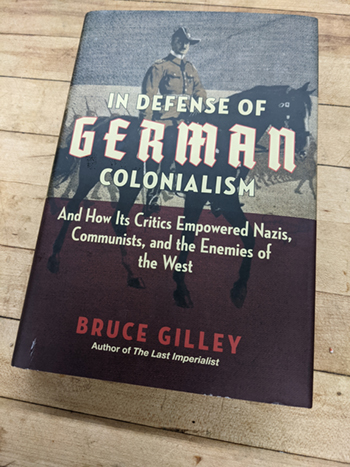The Imperialist Strikes Back! Brandon Smith on Bruce Gilley's Latest Book, posted by Mary Grabar, August 9, 2022
 The opportunity to question my anti-colonial bias scarcely presented itself to me while I was a college undergraduate. As a patriotic American who resented the whimsical tyranny which Britain exercised over American colonists prior to their revolution (as described in the Declaration of Independence), I took for granted that the practice and history of colonialism were indefensible. However, my collegiate consideration of the worth of colonialism had been largely limited to a discussion in an immersive second-year Spanish class in which one student argued that colonization of the Americas benefited some indigenous people with formal education that they otherwise would have lacked. After reluctantly conceding such a point, I was interested to hear a more robust debate on the matter. Although I believed academia would be the proper venue to discuss controversial topics, it would not be until after I graduated in 2017 that one of my professors would bravely expand upon the virtues of colonialism to curious minds around the world.
The opportunity to question my anti-colonial bias scarcely presented itself to me while I was a college undergraduate. As a patriotic American who resented the whimsical tyranny which Britain exercised over American colonists prior to their revolution (as described in the Declaration of Independence), I took for granted that the practice and history of colonialism were indefensible. However, my collegiate consideration of the worth of colonialism had been largely limited to a discussion in an immersive second-year Spanish class in which one student argued that colonization of the Americas benefited some indigenous people with formal education that they otherwise would have lacked. After reluctantly conceding such a point, I was interested to hear a more robust debate on the matter. Although I believed academia would be the proper venue to discuss controversial topics, it would not be until after I graduated in 2017 that one of my professors would bravely expand upon the virtues of colonialism to curious minds around the world.
Bruce Gilley, instructor of my Comparative Politics and Conservative Political Thought courses at Portland State University, submitted his article “The Case for Colonialism” for publication in the Third World Quarterly academic journal in April 2017.
In his article, Dr. Gilley notes the lack of objective research into colonialism's past and contends that thorough cost-benefit analyses into colonial history would reveal that most instances of Western colonization were largely beneficial. He also recognizes the existence of a movement promoting anti-colonial thought that is built upon intellectual expediency and which is easily mobilizable by elites facing pro-colonial opposition. Additionally, he asserts that Western colonialism should perhaps be re-introduced to certain areas that have experienced the ill effects of anti-colonialism. Gilley's piece was published online by Third World Quarterly in September 2017 to an immediate backlash.
Threats for an Article
The initial online publication of “The Case for Colonialism” triggered a mass exodus of nearly half of the members of Third World Quarterly's editorial board, who cited concerns in their resignation letter over Gilley's essay not being properly peer-reviewed in addition to the “offence and hurt” the piece caused. A Change.org petition advocating the retraction of the article received over ten thousand signatures within two weeks of the paper's original release. Although famed linguist and Third World Quarterly editorial board member Noam Chomsky warned that retracting Gilley's piece could lead down a dangerous path, “The Case for Colonialism” was ultimately withdrawn from Third World Quarterly's online journal with Gilley's approval. Taylor & Francis, the publisher of Third World Quarterly, acknowledged that the piece was subjected to a double-blind peer review process, but also that Third World Quarterly's editor received threats of violence related to the article's publication. Gilley's writing was later re-published in the Summer 2018 edition of the National Association of Scholars' quarterly journal Academic Questions.
The vigor with which the anti-colonial resistance reacted to the publication of Gilley's paper justified his assessment of such factions. The resistance was mobilized swiftly to condemn his sentiments on the subject of colonialism, and in an expedient manner that rested upon a mob-like pressure campaign against the journal in which his work was momentarily published rather than critical engagement with its subject matter. Fortunately for those concerned with the state of free academic inquiry like Chomsky, Gilley was undeterred in his effort to espouse the merits of colonialism.
Professor Gilley would soon embark on an even more ambitious project than his pro-colonial paper, though not without his share of detractors. Lexington Books, an imprint of publisher Rowman & Littlefield, reached an agreement with Gilley to issue a series of books by a range of scholars in opposition to anti-colonial outlooks titled Problems of Anti-Colonialism which Gilley was to co-edit. The first offering in the series was to be Gilley's own work, The Last Imperialist: Sir Alan Burns' Epic Defense of the British Empire, which was to be distributed in late 2020. Gilley's endeavor was predictably met with further anti-colonial adversity. Another censorious mob, led by Marxist-Leninist-Maoist philosopher Joshua Moufawad-Paul, coordinated through Change.org to petition Rowman & Littlefield into terminating the planned series. Moufawad-Paul's petition held that Gilley “endorses a white nationalist perspective” and brought in over 750 signatures. Subsequently, Senior Vice President of Rowman & Littlefield Julie Kirsch stated that the publisher intended to cancel their agreement to release the Problems of Anti-Colonialism series. Moufawad-Paul then thanked his petition's signatories and declared that “Rowman and Littlefield paid attention to the academic community” in a petition update.
Moufawad-Paul's victory proved to be partial at best. Despite the Maoist-led row over Gilley's planned series, The Last Imperialist was ultimately released to the reading public in September 2021 through conservative publisher Regnery's Gateway imprint. Gilley's biographical look at the subject of Sir Alan Burns who advanced through the ranks of the British Empire's Colonial Service and championed the continuance of the empire's colonial project throughout the better part of the twentieth century reveals Burns' strategy toward colonial administration while pointing out the deficiency of rapid efforts toward decolonization during his time. As Gilley writes, “A gradual move to self-government was normal in colonial politics for Alan, whose father and grandfather had served in colonial legislatures and cabinets” (pg. 19). His philosophy regarding the political development of colonies emphasized steady evolution (as observed in his administration of the Bahamas and British Honduras, which he helped to gradually transition into stable self-governing democratic states) over radical resolution (such as the United Nations' agreement that put Somalia on a ten-year timetable toward independence from Italy which Burns apprehensively attempted to oversee as UK's representative on the UN Trusteeship Council prior to Somalia being stricken with corrupted elections and guerrilla warfare). Burns' incremental method of colonial governance stressed the fundamental importance of insuring sanitary conditions within colonies by maintaining functional sewage systems and clean toilets so that living conditions could be improved and self-government of a once-colonized people could eventually be attainable. Alan additionally advocated for the construction of libraries and highways to aid colonized peoples' paths to political and economic independence. He also recognized the responsibility of Europeans to empathize with colonial subjects by treating them as equals in order to advance their civilization. He promoted such empathy through the establishment of interracial dining clubs with Nigerians and Ghanaians which encouraged regular interaction and helped build trust between people of different races.
The Last Imperialist is peppered with references to the ideas of the late V.S. Naipaul, a world-renowned writer of Hindu heritage who was born in colonial Trinidad. Naipaul's path from the periphery of the British Empire to become an Oxford-educated Nobel Prize winner bears resemblance to Burns' journey from the island of St. Kitts to a seat on the UN Trusteeship Council. Naipaul's worldview, as expressed in his 1990 speech to the Manhattan Institute titled “Our Universal Civilization,” shares similarities with Burns' outlook by promoting Western ideals such as freedom of choice, responsibility, hard work, and intellectual development. Naipaul describes in his speech what he holds to be the most attractive idea of the civilization he traversed to those outside it, the pursuit of happiness, as “an elastic idea; it fits all men.” Naipaul explains how the English language empowered his father's unlikely career path as a journalist from a humble agrarian colony, and subsequently Naipaul's own introduction to the writing profession, which enabled him to pursue literary excellence in another part of the world. The universalistic viewpoints of Burns and Naipaul were informed by both their colonial origins and engagement with people and ideas from cultures foreign to their own. If Gilley is endorsing the perspectives of his biographical subject Burns and the pro-colonial penman Naipaul, Moufawad-Paul's charge that Gilley “endorses a white nationalist perspective” appears to be wholly unsubstantiated.
In Defense of German Colonialism
 Though Professor Gilley's planned Problems of Anti-Colonialism series was effectively canceled, he remains steadfast in his mission to re-introduce Western colonial ideas into political discourse. His follow-up to The Last Imperialist titled In Defense of German Colonialism: And How Its Critics Empowered Nazis, Communists, and the Enemies of the West is available for release as of August 2022 through Regnery Gateway. Patriotic Americans like myself need not give in to pressure toward concluding that colonialism is an undiscussable evil. Gilley's work demonstrates that as a once-colonized land that transitioned into an enduring project of democratic self-governance, America is one of Western colonialism's successes by Sir Alan Burns' standards.
Though Professor Gilley's planned Problems of Anti-Colonialism series was effectively canceled, he remains steadfast in his mission to re-introduce Western colonial ideas into political discourse. His follow-up to The Last Imperialist titled In Defense of German Colonialism: And How Its Critics Empowered Nazis, Communists, and the Enemies of the West is available for release as of August 2022 through Regnery Gateway. Patriotic Americans like myself need not give in to pressure toward concluding that colonialism is an undiscussable evil. Gilley's work demonstrates that as a once-colonized land that transitioned into an enduring project of democratic self-governance, America is one of Western colonialism's successes by Sir Alan Burns' standards.
 Brandon Smith is a graduate of Portland State University with a bachelor's degree in political science and is a former student of such subversive scholars as Dr. Bruce Gilley and Dr. Peter Boghossian. He currently works as a certified pharmacy technician in Portland, Oregon.
Brandon Smith is a graduate of Portland State University with a bachelor's degree in political science and is a former student of such subversive scholars as Dr. Bruce Gilley and Dr. Peter Boghossian. He currently works as a certified pharmacy technician in Portland, Oregon.





